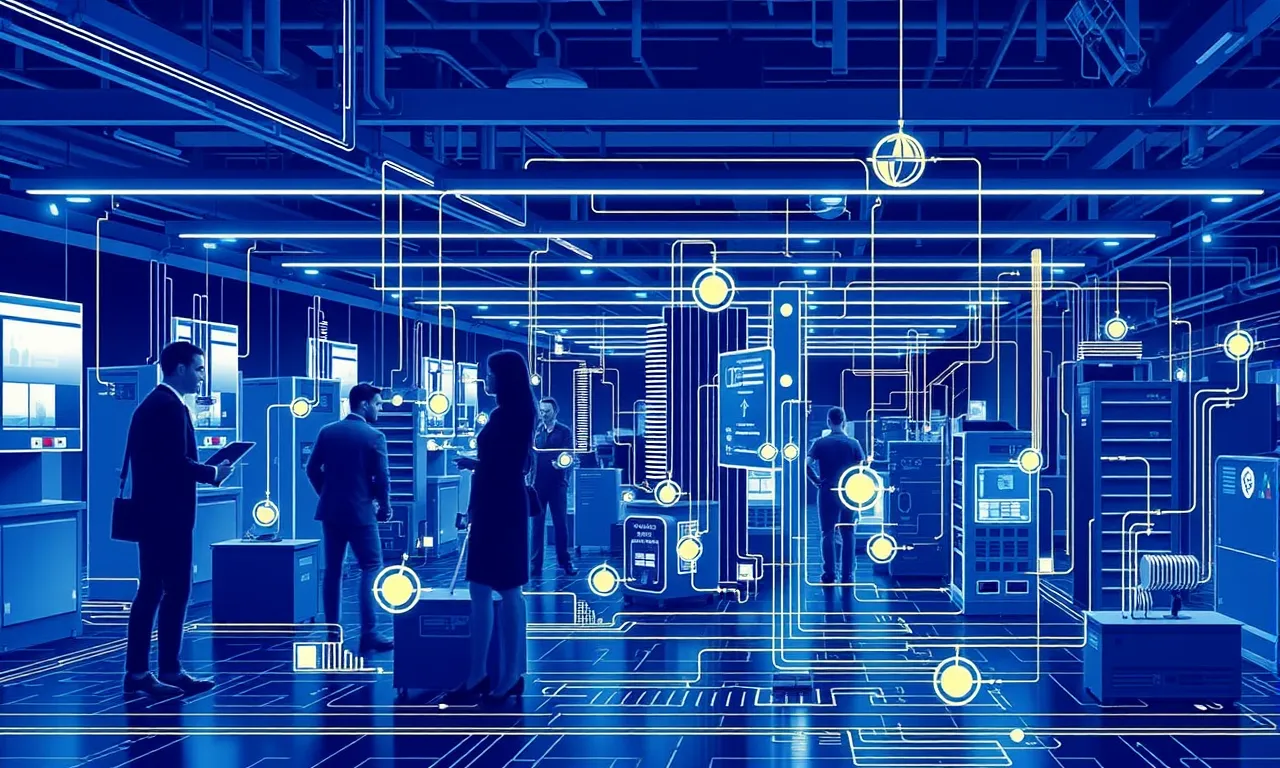
Expert systems may seem outdated. Yet, generative AI does not replace every approach. Many organizations still rely on decision-making frameworks that follow explicit logic. Interestingly, these traditional systems continue to support mission-critical tasks.
These rule-based systems, while often overshadowed by flashy neural networks, remain integral to solving complex, structured problems where precision is key.
Let’s dive into why expert systems are still relevant and how they complement modern AI advancements.
What Are Expert Systems? A Quick Refresher
Origin and Purpose of Expert Systems
Expert systems emerged in the 1970s as one of AI’s earliest applications. Unlike today’s generative AI models, they rely on if-then rules and knowledge bases curated by human experts.
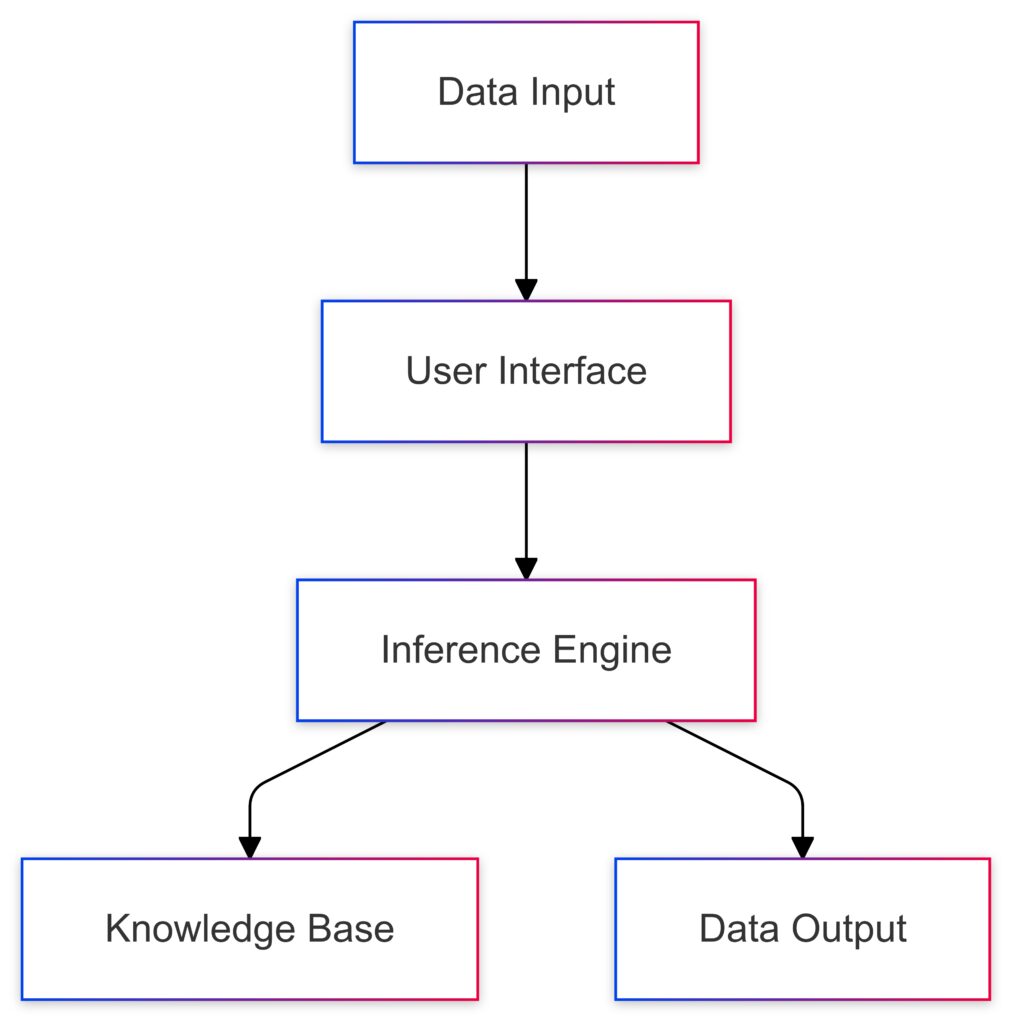
Key components and data flow within an expert system.
Their primary goal is straightforward: solve problems in a way that mimics human decision-making in a specific domain. These systems are most effective in environments where predictability and clarity trump creativity.
How Do They Differ from Generative AI?
Generative AI is designed to handle uncertainty, producing flexible and creative outputs, but it often lacks explainability. Expert systems, on the other hand:
- Are deterministic: They give consistent results based on predefined rules.
- Have transparent decision-making: Every step is traceable.
- Thrive in well-defined domains: Think medical diagnostics, legal reasoning, or supply chain optimization.
Why Expert Systems Still Outperform in Certain Domains
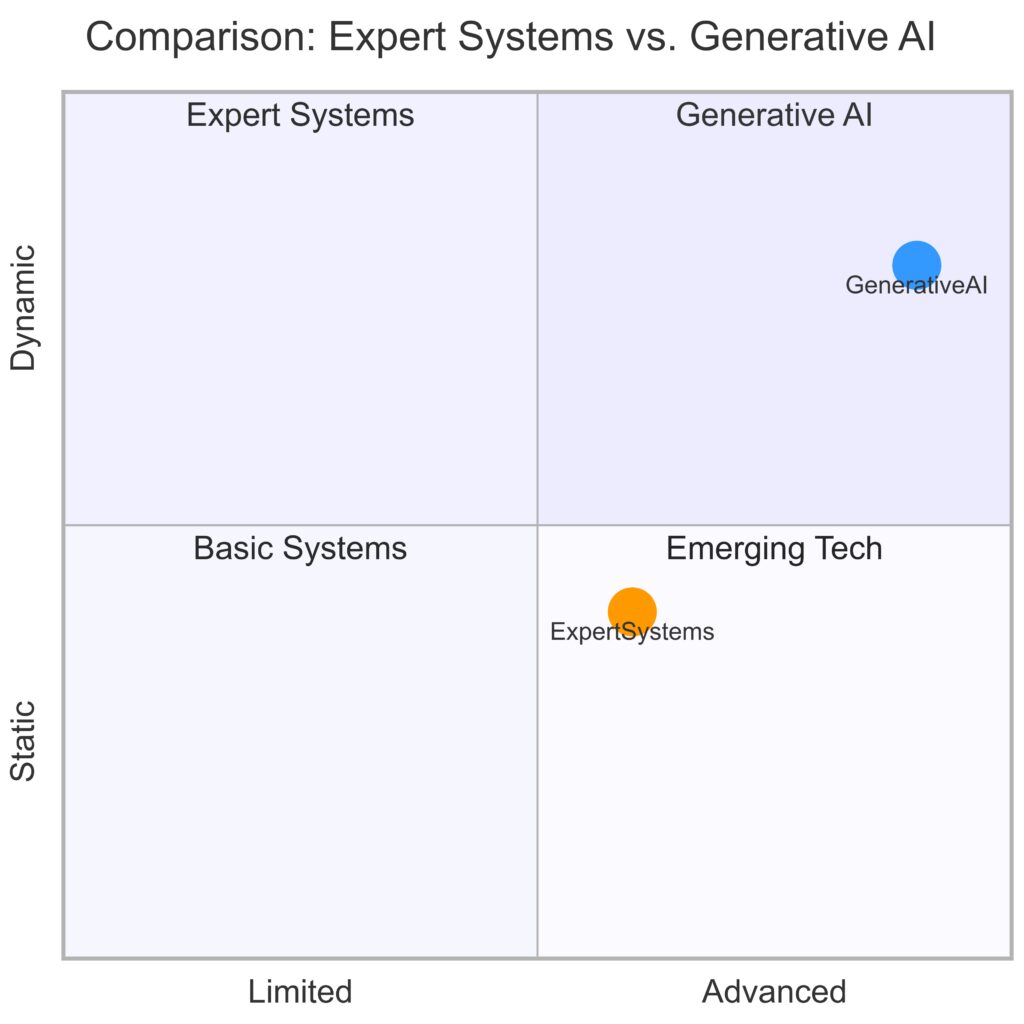
Comparison of expert systems and generative AI, showcasing their strengths and limitations across critical criteria.
High-Stakes Decision-Making
In industries like healthcare or aerospace, a misstep can cost lives. Expert systems excel here because they provide consistent and explainable results.
- Medical diagnostics: Expert systems like MYCIN (an early success story) paved the way for evidence-based medicine. Today, these systems continue to support doctors by cross-referencing symptoms with databases of diseases.
- Aviation systems: Pilots rely on automated systems to detect anomalies in flight paths. These tools are essentially expert systems embedded within larger operational frameworks.
Regulatory Compliance
Generative AI can create or interpret documents, but compliance demands rigid adherence to rules. Expert systems shine in this area.
- Tax preparation software: Rule-based systems help ensure compliance with evolving tax codes.
- Legal decision support: They provide clarity in areas like contract analysis and dispute resolution.
Combining Generative AI and Expert Systems: A Power Duo
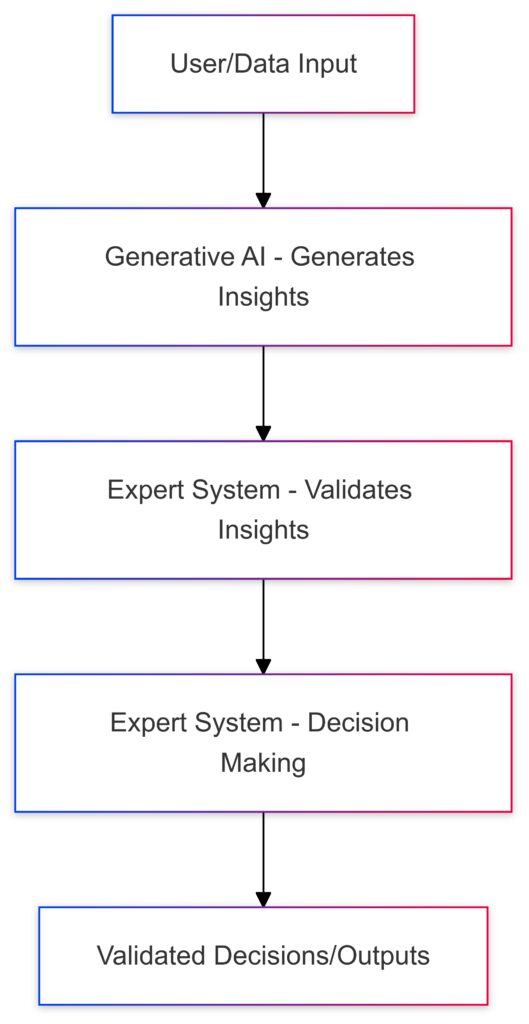
The process of integrating Generative AI and Expert Systems to generate, validate, and act on insights.
Bridging Knowledge Gaps
Generative AI can augment expert systems by filling in knowledge gaps. For instance, AI-generated insights can enhance a system’s knowledge base.
- Example: In a pharmaceutical setting, generative AI might analyze clinical trial data, while an expert system ensures compliance with regulatory standards.
Enhancing Explainability
Expert systems can serve as a checks-and-balances mechanism for generative models, ensuring results are not just accurate but also interpretable.
The Practical Use Cases of Expert Systems Today
Real-Time Applications
Expert systems are the backbone of process automation. Think assembly line robots or fraud detection algorithms in banking. Their fast, consistent decisions ensure reliability in high-demand environments.
Education and Training Tools
From virtual tutors to medical simulators, expert systems offer structured guidance, helping users learn critical concepts in a step-by-step manner.
Challenges Expert Systems Face in a Generative AI World
Perception of Being Outdated
The popularity of generative AI models like ChatGPT and DALL-E has shifted attention away from expert systems. This creates a misconception that rule-based systems are obsolete.
However, their predictable nature is precisely why they remain indispensable in domains where errors are unacceptable. Unlike generative AI, expert systems don’t require retraining or massive datasets to maintain accuracy over time.
Scalability Issues
Expert systems require domain-specific rules, which can make scaling across industries or adapting to new problems time-intensive.
- Example: A tax compliance expert system in the U.S. cannot easily transition to European regulations without substantial reengineering.
- Conversely, generative AI models can adapt across domains with minimal adjustments.
Limited Flexibility
While generative AI thrives in dynamic, creative environments, expert systems lack the ability to evolve without manual intervention.
- Use Case Gap: They struggle in scenarios where novel or unexpected inputs are frequent.
Despite these limitations, their structured frameworks still dominate in areas demanding precision and consistency.
Future Trends: Modernizing Expert Systems
Hybrid AI Models
Combining expert systems with generative AI is gaining traction. Hybrid models merge rule-based reasoning with AI’s ability to handle uncertainty.
- Example: Healthcare diagnostics could use a rule-based system for disease detection, supplemented by generative AI for personalized treatment recommendations.
This collaboration improves the scope, speed, and accuracy of decision-making.
Cloud Integration and Automation
To address scalability challenges, cloud-based expert systems are emerging. These systems leverage distributed computing to handle vast datasets and expand functionalities.
- Automation tools now use embedded expert systems to streamline workflows across finance, IT, and logistics.
Advances in Natural Language Processing
Integrating natural language interfaces allows expert systems to become more user-friendly.
- Example: Chatbots powered by an expert system for legal advice can provide actionable insights based on codified laws, all while communicating in layman’s terms.
The Complementary Roles of Expert Systems and Generative AI
Structured vs. Creative Tasks
Generative AI excels in producing novel ideas, but expert systems remain critical for tasks with clear boundaries and fixed logic. Together, they form a complementary pair.
- Example: In manufacturing, generative AI might design a new product prototype, while an expert system oversees the production line to ensure compliance with safety standards.
Explainable AI (XAI) Initiatives
As AI ethics become more prominent, expert systems are gaining renewed attention for their inherent transparency.
- Generative AI outputs often resemble a “black box,” whereas expert systems’ decisions are fully traceable.
- Integrating the two could lead to more accountable AI systems, especially in regulated industries.
Why Businesses Shouldn’t Abandon Expert Systems
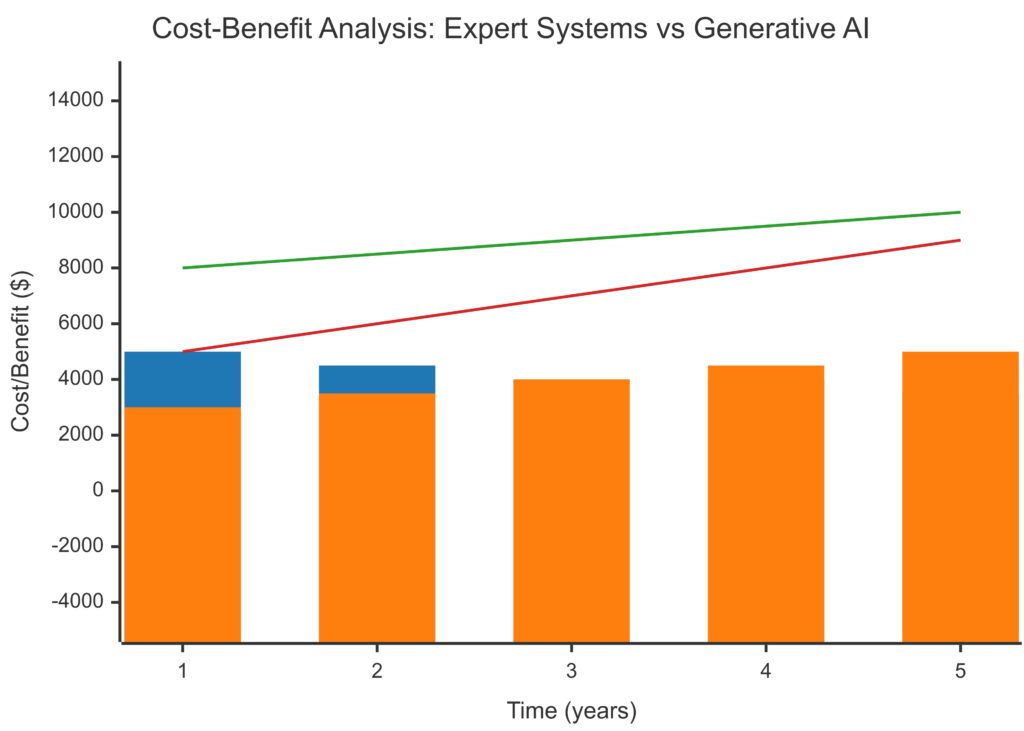
Cost-benefit comparison of expert systems and generative AI, emphasizing long-term efficiency and reliability.
Proven Stability
Expert systems are battle-tested. They’ve operated in industries like banking, energy, and healthcare for decades with minimal failure rates.
Cost Efficiency
While building an expert system might initially be expensive, maintaining it is typically far cheaper than retraining a generative AI model.
Resilience Against AI Bias
Generative AI can inadvertently reflect biases from training data, while expert systems rely on pre-validated rules, reducing the risk of unintended prejudice.
Core Strengths That Matter
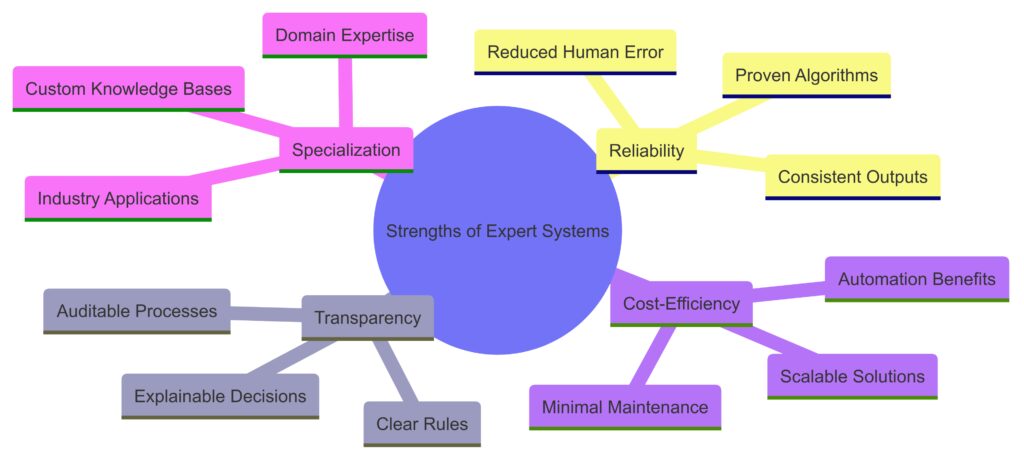
Transparency and Explainability
The rules-based nature of expert systems makes their decision-making process easy to explain. In contrast, generative AI models often function as black boxes, producing outputs without clear reasoning.
This transparency is crucial in industries where accountability is non-negotiable. For example:
- Regulatory compliance: Systems that can provide a reasoning trail are favored by regulators.
- Healthcare and finance: Transparency ensures trust, allowing professionals to verify and understand the logic behind decisions.
As AI ethics and explainability gain prominence, the value of expert systems in providing clear, defensible answers continues to grow.
Reliability in High-Stakes Environments
Expert systems thrive in scenarios where precision is paramount and the cost of error is massive. Unlike generative AI, which sometimes relies on probabilistic reasoning, expert systems stick to logical pathways to meet defined criteria.
- Industrial processes: Stability in manufacturing operations ensures that production stays on track.
- Medical diagnostics: Systems reduce the risk of oversight, improving outcomes for patients.
This unmatched reliability fosters confidence among decision-makers, making expert systems a cornerstone in high-stakes industries.
The Lasting Relevance of Expert Systems in AI Evolution
Building Trust in Automation
In today’s AI-driven world, trust is paramount. Expert systems continue to offer reliability, a feature that many generative AI models struggle to match. Their explainable logic ensures that stakeholders can confidently rely on their outputs.
- Whether it’s evaluating creditworthiness or guiding treatment plans, these systems instill confidence in automated decisions.
Supporting Niche Industries
Certain industries, like pharmaceuticals or energy, require highly specialized knowledge bases and compliance-heavy workflows. Expert systems have proven their staying power by providing solutions tailored to these high-stakes environments.
Conclusion: Coexistence Over Competition
While generative AI dazzles with creativity, expert systems stand firm as the backbone of structured problem-solving. Their enduring value lies in their predictability, transparency, and precision—qualities that generative AI often cannot guarantee.
The future isn’t about choosing one over the other. Instead, businesses can harness the strengths of both systems to create powerful, hybrid solutions that combine innovation with reliability. Expert systems may not dominate headlines anymore, but their legacy—and utility—is far from fading.
FAQs
Can expert systems adapt to new information or trends?
While expert systems are not inherently adaptive, they can be updated manually by modifying their rule base. This process ensures that they remain accurate and relevant without risking unpredictability.
- Example: A tax expert system can incorporate new legislation annually without requiring a full system overhaul.
Generative AI, by contrast, needs to be retrained with new datasets, which can introduce errors or biases.
Are expert systems expensive to maintain compared to generative AI?
Expert systems have a higher initial development cost because they require domain-specific expertise. However, their maintenance costs are often lower because they don’t need extensive retraining or massive computational resources.
For example:
- A legal decision-support system only needs occasional updates to align with new laws, whereas a generative AI model analyzing similar cases might need continual fine-tuning and significant processing power.
Over time, expert systems can be more cost-effective for well-defined problems.
Why are expert systems preferred in life-critical applications?
Life-critical applications—like those in healthcare, aerospace, or defense—demand unwavering reliability and explainability. Expert systems thrive in these environments because:
- They provide consistent outputs, eliminating guesswork.
- Their decisions can be audited to ensure compliance and accuracy.
For example:
- Medical imaging systems use expert rules to flag abnormalities with precision, reducing the risk of false positives.
- Air traffic control systems rely on expert systems to avoid errors that could endanger lives.
Generative AI’s probabilistic nature makes it less suitable for these high-stakes tasks.
How do expert systems handle bias compared to generative AI?
Expert systems are less prone to unintended bias because their rules are explicitly programmed by human experts. Bias can only occur if the rules themselves are flawed.
- In hiring systems, expert systems might evaluate candidates based solely on qualifications and experience, avoiding implicit biases found in datasets.
- Generative AI, however, can inherit biases from its training data, which is often vast and difficult to fully vet.
This makes expert systems a safer choice in scenarios where fairness and neutrality are vital.
Are expert systems suitable for small businesses?
Yes, expert systems can be highly beneficial for small businesses, particularly in niche markets or areas with fixed processes.
- Example: An e-commerce store might use an expert system to manage inventory based on predefined rules like reorder thresholds or seasonal trends.
- Similarly, a small tax consultancy firm could use an expert system to ensure accurate filings without needing a team of accountants.
Their simplicity and reliability make them an attractive, cost-effective option for small-scale operations.
How do expert systems enhance operational efficiency?
Expert systems are designed to automate repetitive and predictable tasks, reducing human error and saving time.
- In manufacturing, expert systems monitor and adjust machinery to ensure consistent quality.
- In customer service, rule-based chatbots can resolve common queries quickly, freeing up human agents for more complex issues.
This results in smoother operations and significant cost savings.
Are there modern advancements improving expert systems?
Yes, expert systems are evolving through integration with newer technologies, such as:
- Cloud computing: This allows for better scalability and accessibility.
- Natural language interfaces: These make expert systems more user-friendly, enabling employees to interact with them conversationally.
- AI hybrids: Combining expert systems with generative AI provides more robust, adaptable solutions for complex problems.
These advancements keep expert systems relevant and competitive in today’s tech-driven world.
Resources
Research Papers and Articles
- The Evolution of Expert Systems in AI (Journal of Artificial Intelligence Research): A scholarly overview of how expert systems have evolved over the decades.
- Applications of Expert Systems in Healthcare (Springer): A deep dive into how these systems have transformed diagnostics and treatment planning.
- Bridging Expert Systems and Machine Learning (IEEE Transactions on AI): Discusses hybrid systems and their potential to tackle complex modern challenges.
Websites and Blogs
- AI Magazine: Regularly features articles on the latest in AI, including the ongoing relevance of expert systems.
- Towards Data Science: Hosts practical guides and case studies on building and applying expert systems.
- Expert Systems with Applications Journal: A go-to resource for cutting-edge research on rule-based systems and their integration with new technologies.
Tools for Building Expert Systems
- CLIPS (C Language Integrated Production System): A popular tool for creating rule-based systems, often used in academia and industry.
- Drools: An open-source business rule management system used for creating expert systems in enterprise applications.
- Jess (Java Expert System Shell): A Java-based tool designed for building expert systems, with a focus on fast prototyping.
Communities and Forums
- AI Stack Exchange: A forum for asking technical questions about expert systems and related topics.
- Reddit’s r/artificial: A community where enthusiasts discuss AI technologies, including expert systems.
- KDNuggets: Hosts regular articles and discussions on data science, AI, and the role of expert systems in modern applications.